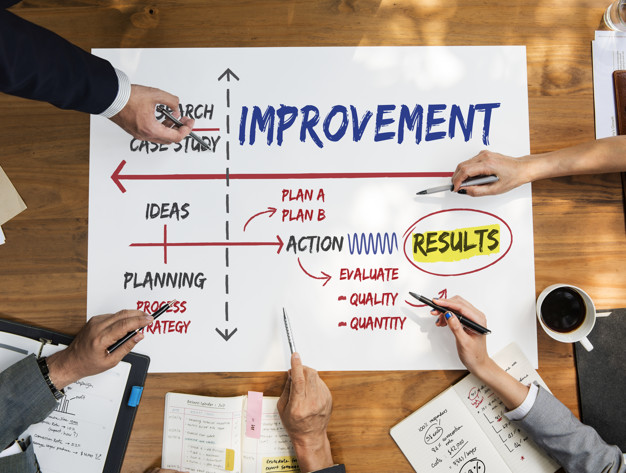Kapanlagi.com - Evaluation is a very important thing to do. Evaluation is a performance assessment commonly done at the end of an activity, program, or work process. Evaluation is very important to be used as a provision or reference in conducting similar activities in the future.
In addition, in the world of work and industry, evaluation is commonly done routinely. In this case, evaluation is useful for projecting future steps to improve productivity. Evaluation not only discusses technical matters, but also other matters related to program activities. Because only by doing so, evaluation will get a comprehensive assessment.
Evaluation is an assessment of the sustainability of an activity, program, or job. How is the full explanation? Check out the following review that has been summarized from various sources.
1. Understanding Evaluation

(credit: freepik)
Evaluation is a very important thing to be applied in any field. To better understand what evaluation is, consider the following explanations from the experts.
1. William A. Mehrens and Irlin J. Lehmann
William A. Mehrens and Irlin J. Lehmann (1978) explain the understanding of evaluation as part of the process of planning, obtaining, and providing information to prepare decision alternatives.
2. Anne Anastasi
Anne Anastasi (1978) believes that evaluation is a systematic process that determines whether instructional goals are achieved by an individual or group. Evaluation becomes a planned, systematic, and directed assessment activity based on goals.
3. Norman E. Gronlund
Meanwhile, according to Norman E. Gronlund (1976), evaluation is a systematic process that determines decisions related to the achievement of a goal in student learning.
4. A.D. Rooijakkers
A. D.Rooijakkers argues that evaluation is an effort or process to determine values. Furthermore, evaluation is also defined as a process of giving value based on quantitative data measured for decision-making purposes.
5.Sajekti Rusi
Another opinion about evaluation is presented by Sajekti Rusi (1988). Sajekti Rusi explains that evaluation is the process of assessing something, including the description of student behavior both quantitatively and qualitatively.
6.Suharsimi Arikunto
Suharsimi Arikunto (2003) explains the meaning of evaluation as a series of activities aimed at measuring the level of success of an educational program.
7.Abdul Basir
The last opinion is delivered by Abdul Basir (1996). According to him, evaluation is a process of collecting descriptive, informative, and predictive data carried out systematically and gradually. Its purpose is to determine policies in implementing efforts to improve the education system.
Based on the explanations above, it is evident that evaluation can be applied not only in the workplace but also in education to measure students' abilities, as well as in daily life to obtain values.
2. Objectives of Evaluation
Evaluation is an important process in implementing a program or activity. In the workplace, the task of evaluation is carried out by the Human Resources Management (HRM) department. As the responsible party for conducting evaluation, HRM management has specific objectives. The objectives of evaluation are as follows.
1. Evaluation can be conducted to identify the obstacles faced by workers in performing their tasks. Therefore, the results of the evaluation can be in the form of diagnosis and followed by providing training or remedial teaching.
2. Evaluation can be conducted to determine the level of mastery and understanding of an individual's competencies and responsibilities in the field of work.
3. Evaluation can be conducted to measure the effectiveness and efficiency of methods, techniques, or approaches that have been applied in carrying out the production process.
4. Evaluation can be conducted to provide feedback information regarding program implementation, in order to improve any existing deficiencies.
3. Evaluation Function

(credit: freepik)
Evaluation plays an important role in the progress of an individual or group in the future. With evaluation, previous mistakes can be avoided in the future. In addition, evaluation also serves many purposes. The functions of evaluation are as follows.
1. Success Measurement Function
In addition to assessing failure or mistakes, evaluation also functions to measure the level of success of a program. Specifically, assessing the methods used, the use of resources, and the achievement of goals.
2. Diagnostic Function
Secondly, evaluation serves a diagnostic function. This means that evaluation activities are carried out with the aim of identifying the strengths and weaknesses of an individual in mastering a specific competency field.
3. Selective Function
Thirdly, the selective function is the function of evaluation activities in measuring and selecting individuals based on established competencies or standards.
4. Placement Function
Fourthly, the placement function is the evaluation activity aimed at determining the best position for an individual in a specific field.
4. Stages of Evaluation

(credit: freepik)
Evaluation is a crucial process or stage in a program or activity. Evaluation plays a very important role in the progress of an individual or group. Therefore, the evaluation process must be done carefully and cannot be done haphazardly. Here are several processes or stages in evaluation.
1. Determining the Evaluation Topic
This process is a fundamental stage. It is important to determine the topic or agenda to be evaluated. The goal is to ensure that the discussion in the evaluation does not deviate and can stay focused.
2. Designing the Evaluation Activity
In the second stage, the process of planning or designing the evaluation activity is carried out. The goal is to ensure that no aspect or implementation is missed or left behind.
3. Data Collection
The process of data collection is done by gathering materials and recording any data or information that will be presented in the evaluation.
4. Data Processing and Analysis
This stage of the evaluation activity is carried out with the aim of processing information by categorizing data. This way, the evaluation process will be easier, especially in conducting analysis and determining the benchmark for how long the evaluation will be held.
5. Reporting the Evaluation Results
This stage is carried out after conducting various evaluation activities. This stage is followed by the activity of creating a report. The purpose is to use the evaluation results, which are in the form of reports, as a reference for future activities.
That is a review of the evaluation being an important process in an activity or program. Hopefully, it is beneficial and can increase insights.
(kpl/psp)
Disclaimer: This translation from Bahasa Indonesia to English has been generated by Artificial Intelligence.















